Any good black box conceals the nasty insides that make it work. The city of Tempest is no different. Such a prosperous city is sure to have several underground forces pulling the right levers and holding even the most untouchable purses. But with so much power being shifted around, the most cunning take steps to stay in the shadows until the right moment to strike.
Dominare is all about the dark inner secrets of Tempest, continuing on the story from Mercante. Power and influence are dished out, along with piles of crowns, to advance various conspiracies; each entity acting on the same goal of monopolizing the shady dealings of the city. With a very different feel than Love Letter and Mercante, Dominare takes the theme of influence from Courtier and runs in a different direction. How does this compare? Lets take a look.
Overview
In Dominare, each player is working towards building up their Conspiracy, using agents to spread influence over the city. At the end of the game, players are awarded points for city blocks and districts they control and lose points for their exposure attracted to themselves.
[singlepic id=19205]
The game is played over seven seasons. At the start of a season, each player simultaneously selects one agent from their hand to play into their Conspiracy. Agents provide a number of different effects to the game both in the Canvassing phase and the Action phase. Once played, an agent stays on the table for the rest of the game. So over the course of the game each Conspiracy grows larger. The new agent is played into a numbered rank corresponding with the season. So the first agent is played in to rank one, and so on. When an agent is played, an associated exposure cost is incurred by the player. This exposure determines player order, with the highest exposed player being first, and designated as the Scapegoat. In general, the Scapegoat position is avoided because in the next step an event is drawn that causes some amount of uncertainty to the players. These events are weighted against the Scapegoat, either penalizing them, or giving the other players some benefit.
The core of the game is found in the Canvassing and the Action phases. During Canvassing players collect income and place influence provided by their agents. All players canvas with their first rank agent in player order, then move on to all player’s second and so on until all agents have been utilized. Most agents are associated with a particular area of the city, and thus can only place influence into their own area. Each block can only contain one player’s influence, any other influence that is added is canceled out, one for one.
After the Canvassing stage, there are two rounds of actions, performed in player order. Every player has access to a set of basic actions, but the interesting actions are found on the agents themselves or on district abilities. Whoever controls the most blocks in a given district can activate that district’s ability. Agents each have various abilities that are numbered, but they must be in that rank or higher to use them. This means that the more powerful abilities are not available until the end of the game. The abilities cover just about all aspects of the game. Some will allow for addition or removal of influence, stealing coins from other players, drawing more agent cards or adjusting the victory point value of a district.
To augment both the Canvassing stage and the available actions to a player, agents all have some sort of profession, or even multiple professions. During Canvassing, if an agent is next to another agent that shares a profession, both agents get an additional bonus influence. During the action phase, some actions will allow for bonus profession actions. These would be actions found on an agent that shares the given profession.
At the end of the seventh round, player’s scores are calculated starting with the points for each of the blocks they control. Then the players who control each district are awarded points based on that district’s value. Lastly, the current Scapegoat is penalized based on their exposure, losing one victory point for every three exposure and the rest of the players are penalized one point for every five victory points. Whoever has the most points has established the strongest conspiracy, and takes over the city of Tempest.
Things and Bits:
Dominare is one of the best looking games in the Tempest line. The art is cohesive and well laid out. The agent cards are colorful, while still indicating important information about the agent’s area of influence. Each agent card has five or six different pieces of important information, but with a slick layout, the information is easy to see and process. Some of the art is shared from other Tempest games, giving a sense of familiarity to those who have played them. Component quality matches the standard high marks of the rest of the Tempest line.
[singlepic id=19202]
Refreshingly, we were able to play almost right out of the box. The rules are very well laid out with examples to outline the tricky parts. Dominare is more complex than the other Tempest games, however the game mechanics are intuitive and make thematic sense. The straightforward nature of the rules aids in helping out new players, as do useful player reference cards.
Dominare comes with a double sided map, one side for two to four players and the other for five to six players. The number of blocks per district is the only difference between the two, giving more room for more players. Based on the back and forth tension of the game, a two player game is almost worthless. While the game is enjoyable with six players, it can drag on for a little too long. This is because each phase introduces a new agent to player’s ranks, by the seventh season there are forty two agents that need to be Canvassed. The sweet spot is right around four players, this gives enough tension, while not dragging on too long. Expect game times to be in the hour and a half to two hour time frame.
Thoughts:
The most interesting and unique aspect of Dominare is how the agents interact with the game. The structure forces players to make significant choices in planning during every season. I would argue that the choice of agent in the first season is just as important as in the seventh season. Some agents are only useful for their abilities, and some are only useful for the money they pull in. The particular faction that an agent belongs to ends up defining your whole strategy. If you only play commoners and merchants, you will likely not have any way to influence the Senate or the Church. This strategic planning is rather rewarding.
In addition, agent abilities and professions lead to intense combination plays that are almost necessary for a viable strategy. During the Canvassing step, the additional influence provided from a neighboring agent can be the difference between controlling a district and being pushed out. Similarly, many of the later game agent abilities allow for free actions of a similar profession. This cascading action chain can allow for players to utilize three or four agent abilities in one action. You know you are in a good position when all of your agents have an influence bonus and you are able to use all of your agent’s abilities by the end of the round. It feels good!
All that being said, the interlocking nature of the agents leads to one of my biggest complaints of the game. It seems like the winner of the game is the person who was dealt the best agent cards. Having agents that synergize is essential. The subset of cards that work well together seems to be smaller than the subset that do not work well together. Along with that, there are some very powerful agents. Powerful to the point where they feel broken. Sure, most of the powerful abilities are only available in the sixth and seventh round, and these powerful agents increase exposure greatly; however a single agent can swing the game in a player’s favor. The real possibility of not being able to synergize and/or draw one of these powerful agents leads to some players having a poor play experience that is out of their control. There are mechanisms in the game to draw more agents, but those all take precious actions to perform. In my first game all I received were moderate agents, and I had no way of combating my opponent’s well formed Conspiracies and super powered agents.
The event cards can also be rather unforgiving. In one particular case, one event card caused three players to lose over half of their influence (losing them control of all of their districts) and left the other players in great shape to take over. The players who were penalized were not selected based on points or relative power, it was based on their agents. This type of mechanism is normally used as a catch-up mechanic, but seems like it is just to incite chaos. On the other hand, I do really enjoy how the Scapegoat is often targeted as the receiver of the bad events. This fits rather well thematically.
[singlepic id=19207]
Speaking of theme, Dominare sets itself apart in the Tempest line (and many Euro games for that matter) by being doused in theme. Players are immersed into the city, agent names are being dropped and gang nicknames are being given. As previously mentioned, the agent cards are fully saturated with game play information, but each one has one line of flavor text that is able to pull the agent out of the card and give them a personality. The theme of the character is translated by their actions and their art. And don’t forget, this is a game about the shady underbelly, so it is full of corrupt Priests and not-so-legitimate businessmen, all the way up to suspect royalty.
My second biggest complaint is that the game can be extremely swingy. A player can go from feeling great about themselves to being crushed in a matter of minutes. This is caused by aggressive opponents, the crazy variation in agent power and the influence of event cards. Some might see this as a design requirement for an area control game, but others become aggravated by the constant assault on their plans. A player can focus on building up their control of a district for four or five turns and in the last season of the game it is possible for another player to sweep in and take it. This destructive nature of the game is not always the best received. In two of our games there were high tempers by the end of the game. I had to remind everyone, including myself, that the whole point of the game was to have this tug of war back-and-forth and that no one should take actions personally.
Dominare
Designed By: Jim Pinto
Published by: Alderac Entertainment Group
Players: 3-6
Ages: 12+
Time: 120 minutes
Mechanics: area control, card combinations, action selection
Weight: medium-heavy
MSRP: $59.99

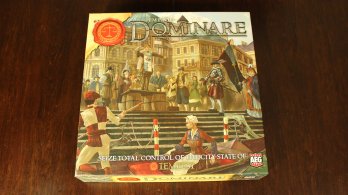
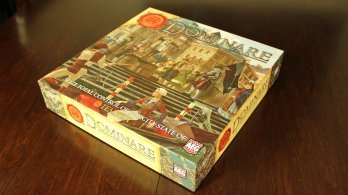
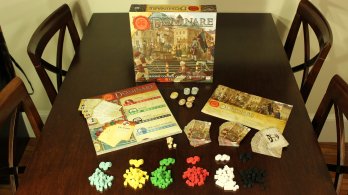
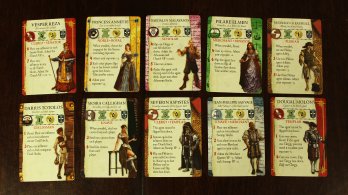
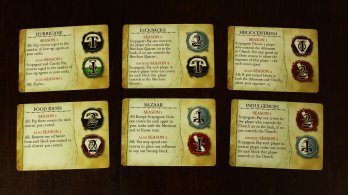
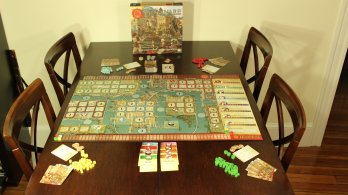
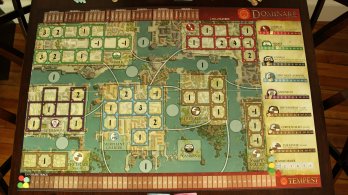
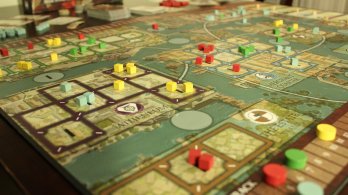







![Watch out for [REDACTED]! – Pandemic Legacy](/content/images/size/w30/2025/02/pandemic_leadin-jpg.webp)







